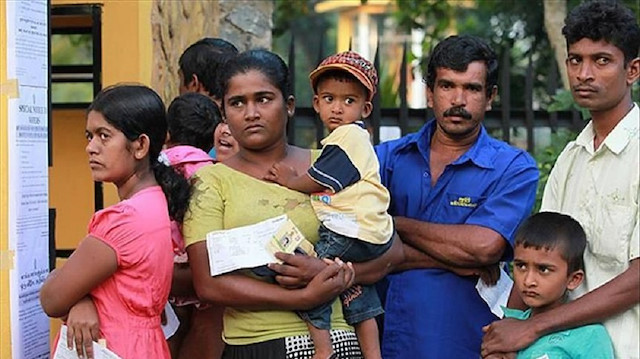
16 million voters will choose new president among 35 contestants on Nov. 16 in island nation
As the final countdown begins for the presidential elections in Sri Lanka, two major contestants Gotabaya Rajapaksa, 70, of the Sri Lanka Podujana Peramuna party and Sajith Premadasa, 52, of the United National Party (UNP) are seeking votes offering a contrasting agenda.
As many as 16 million voters will choose the new president among 35 contestants on Nov. 16.
While Rajapaksa, who as the secretary of defense played a key role to defeat the rebel Tamil tigers known as LTTE, is using national security as his poll plank, reminding people the April Easter bombings, his rival Premadasa is banking upon a social welfare approach. Pledging to end poverty and to maintain human rights, he is appealing to minority communities Tamils, Muslims and Christians to vote for him, in the predominantly Buddhist majority country.
On April 21, Easter Sunday, three churches and three luxury hotels, were targeted in a series of coordinated attacks, killing 259 people, including 45 foreign nationals.
Talking to Anadolu Agency, Keheliya Rambukwella, spokesman of Rajapaksa, said that promise of providing national security will remain his foremost agenda. “All countries prioritize national security. There is no point in talking about reconciliation without ensuring national security,” he said.
He castigated the government for its failure to pay attention to national security, which according to him has resulted in everything that has gone bad in the South Asian country.
A unique feature of the 2019 presidential polls is that the ballot paper will be the longest, 26 inches in length, to accommodate names and symbols of 35 candidates. At least 148 foreign election observers including from the European Union Election Observation Mission as well as Asian Election Observation Organization will arrive in the country to monitor the election.
Harin Fernando, a minister in the current government, who has been widely campaigning for Premadasa, also insisted that national security was "important for Premadasa, as he lost his father -- Ranasinghe Premadasa, the third president -- in a terror attack carried out by an LTTE suicide bomber in 1993."
"We will at no point compromise on it," he told Anadolu Agency.
But taking a swipe at his rival, he tried to unearth a link between the Easter attack and Gotabaya announcing his candidacy for presidential elections. Fernando said that questions have been raised about a more sinister attempt behind the incident and whether a certain group was behind it for seeking political gains.
“The attacks happened on April 21 and Gotabaya announced his presidency on April 27, so if you connect the dots, it raises some huge questions,” he claimed.
Jehan Perera, executive director of a think tank, National Peace Council said that during the past five years, Sri Lanka has been experiencing the slowest economic growth ever, leading to widespread disillusionment with the current government.
“It is generally appreciated for restoring a political space for civic groups. But opening of this space was uncontrolled and often chaotic. Rajapaksa is receiving open support from the corporate sector. They perceive him as a strong leader, who will bring order and offer one-stop solutions,” said Perera. He, however, added that Premadasa’s track record of social service to the poor was working for him on the ground.
Colonel R. Hariharan, a retired Indian army intelligence officer having considerable experience in Sri Lankan affairs, said Premadasa’s approach to bringing peace and reconciliation has brought him praise in the international community. But, Gotabaya’s assertive and focused leadership that he displayed during the Mahinda Rajapaksa’s rule has earned him also a number of followers.


